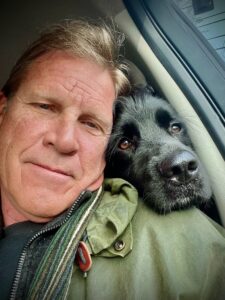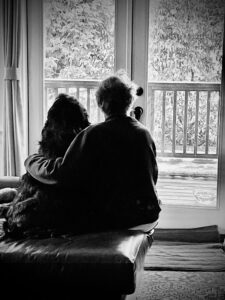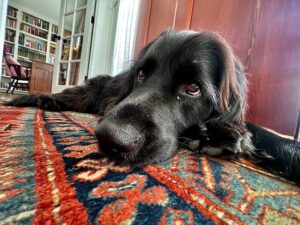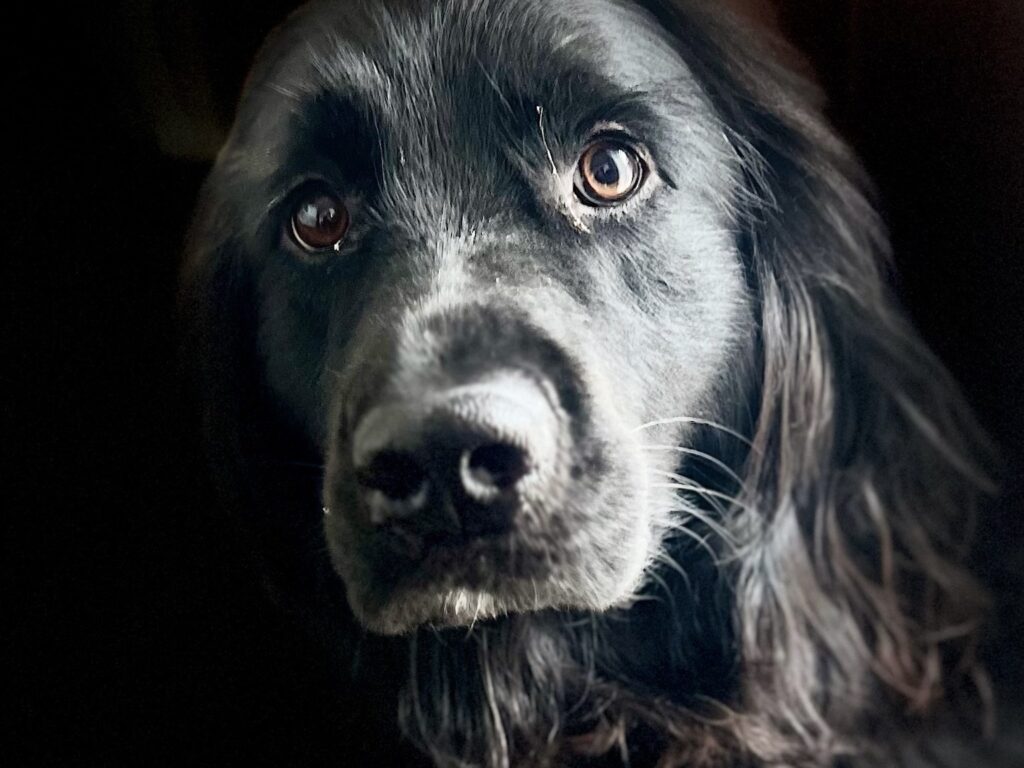Saint Baxter, you wise, goofy, old fool. Baxter was our first ‘borrowed’ dog together. We talk about him a lot. At Montparnasse station yesterday, neither of us entirely sorry to be leaving Paris (for the second time), confounded by confusing French on the loudspeaker and overhead monitors, while we waited for the all-important platform to be announced, we checked in with each other.
Our first ten house sits behind us, we made lists. Loves (too many to mention), Dislikes (too few to bother) and talked about all of the animals we’ve cherished this year. Three-year-old Baxter, half-prince, half-oaf, in frigid Portland, our first beloved dog, together.
Looking back, Baxter was more than just our first charge. He was there at the beginning of our new thinking about a lot of things. Big, weighty social constructs: religion, politics, education, health, science. The way we care for the least among us, and what that says about how we love each other. It’s a little odd that this lumbering, big-hearted dog bore witness, inspired, really, some of our early breakthroughs, but there it is. Out of this hulking mass of panting, drooling love came the beginning of a lot of magical thinking.

We’d flown from Puerto Vallarta to LA with five (five too many, according to one of us) cases; the day we set out, we pared down to three, having dumped a couple in my storage unit near my old home in Santa Monica. My hoarding will be detailed in future entries, I’m sure, if not some tragic reality show. Just like sleeping temperature, packing ‘style’ compatibility should probably be sorted out early in a relationship…or at least early in a grown-up gap year adventure. Alas, seven countries and three continents later, we’re still sorting each other’s unique take on that score.
As we headed north up the old coast road, the temperature seemed to drop a few degrees every little stretch of miles. And, except the harrowing vertical drops and cliffside stretches, where even God doesn’t seem to think it’s safe to sleep, most of the Pacific Coast Highway is dotted with shabby tents and makeshift huts. These are the overnight pop-up communities of California’s mushrooming homeless population. I lived here for many years before COVID; so I thought I’d be used to the near-constant sight of people living along roadsides, under bridges, combing through bins, crouching along freeway off ramps. As we made our way north through Los Angeles, past Oakland, into San Francisco, the problem intensified. We stopped to visit dear friends of mine just outside of San Francisco – they revealed they haven’t been in to the city in well over a year. In the “eerie” contest, it was a toss-up between the Esplanade in downtown San Francisco and the tour of Alcatraz. (During my last business trip to SFO, I stayed at an extremely upscale downtown hotel, where permanent signs in the lobby now read: “Please allow us to escort you to your car or Uber for your safety. Do not exit without a member of hotel staff.”). But even California, which has always beckoned the homeless with its weather and social climates, did nothing to preparus for what we’d face farther north.

We arrived in Portland in early February. If you have never been here, this might not be the time to do it. A bleak month in most of the north, Portland in February made the rest of the world look like it wasn’t even trying. This was as far north as we’d been together, and by far the worst we’d seen. Grit-encrusted snow did little to conceal the filthy, tattered, impossibly thin sheets of vinyl dotting street corners, lining parking lots and parks. You literally can’t move ten meters in Portland without happening upon a new makeshift tent village, or patchwork quilt of discarded tarps, cardboard, corrugated scraps of siding. On the threshold of nearly every business, one finds a crumpled soul, faces turned down, shivering against the icy cold air. And the people of Portland are developing a telltale tic – nervously looking away from the people they are stepping past, and often, over.
We were sitting for a lovely couple in their late 40s – he was a GP for a large firm, she stayed home with their two daughters in the cutest craft home in SW Portland. Their eldest daughter has severe health challenges, and lives in a separate apartment unit under their home with round-the-clock medical care (this wasn’t disclosed in their listing, but for some reason, rather than upsetting us, it further cemented the feeling that we were somehow meant to be here); their youngest had graduated from college and was working in Australia. So, they filled their nearly empty nest with Baxter. For them, too, it was their first real adult get away. You could feel the importance that it go perfectly from all four of us humans. Only Baxter seemed certain that all would be well.

Baxter was a gentle giant, a Newfoundland, covered in shaggy black fur, with a reddish-tinged tuft on top of his head that evoked a rebellious teen’s mohawk…messing up his hair was irresistible. Honestly, Baxter had more of a soul/blues vibe than punk; there was something that just begged to call him, “Dude”.
I’d referred to this as our “practice housesit”. Darren already had over 25 housesits under his belt since retiring, but this was all new terrain for me. I was anxious that we should be superstar sitters here, before the farther and more foreign lands beckoned.
Living together in Mexico had been a little surreal – nothing but leisure time in paradise. It was like a really long first date. But pulling up stakes, locking arms and leaping, spinning the globe like a game, and installing ourselves in other peoples’ lives was a very different thing. Not for the faint of heart, this roaring vortex of sudden changes, thrusting us out of our comfort zone. It was a very strange time for us, no way around it. A new beginning, certainly. Some ‘needle-off-the-record’ endings, too.
Enter our new friend Baxter, and the freak blizzard of ’23; within two days of our arrival two feet of snow and ice encased Portland. Darren was a sight -– still Mexico-bronzed – gamely shoveling mounds of snow in his Aussie hat, Baxter beside him, bounding and leaping with all the grace of a Mack truck. He never left our sides, it seemed, or rather, Darren’s. Their listing had said, “Very important: Must be willing to let Baxter sleep in the bed with you.” No problem, for Darren and Baxter, lol. Little did we know It was to be our last big comfy king sized bed for many months to come, and we shared it with a new, panda-sized friend.

He was 90 pounds of pure clown, always eager to jump in the tiny all-electric car his owners had left, ready for anything. Baxter was an unlikely constant companion — definitely not a “purse dog”, even by my purse’s standard — but we brought him everywhere. As is often the case, I was a bit of a superfluous addition to the pack. He’d hop in the rear of the tiny car, then wedge himself between the front seats, so he could be nearer Darren. We hit Powell’s Books, the Japanese botanical gardens, the army base just over the Washington border, the waterfall, and daily romps with a wiffle ball in the two-foot snow drifts the freak blizzard had provided.
Portland was a mess. The trouble was born out of a confluence of circumstances that clearly demonstrate bad policy in action. “The City that Works”, quite simply, doesn’t. Once among the friendliest cities in the country – to the planet and its people – facing the post-pandemic economic realities just wasn’t in the Portland playbook. Escalating real estate and rent prices, woefully ineffective treatment of mental illness/drug addiction, poorly resourced rehabilitation after job loss, Portland is now, literally, the perfect storm. Its vast green space – once the envy of the nation – is just endless tent space today. And as of this posting, they just passed a city-wide ordinance against camping during daylight hours. Someone please tell me what making everyone pack up and play musical tents will solve.

We started really noticing, and obsessing, over the problem all around us. The city had just unveiled its new “homeless pods” – tiny white enclosed structures that reminded me of the kids’ play houses when we were young – and the first of many such shelter villages had opened right in our neighborhood. They’d strung fairy lights over the pod village, giving it the look of a Christmas tree lot, only much shabbier, and not at all jolly. And criminally, not a solution.
Watch for a post devoted just to this, but for a preview: we’re sickened by the part of our society who have turned away and discarded the other part. Surely, it’s a leading indicator of a society where all of our souls are in complete decay. And we have a theory on how it got this way and a few ideas on what to do about it.

In the meantime, always get the doggie bag or extra supplies in the BOGO deal and give some of the warmth or sustenance you have to spare to the very next man, woman or child you see struggling on the street. And meet their eyes with yours.
We love ya, Baxter. Keepin’ it Weird, Portland? I mean, really…
